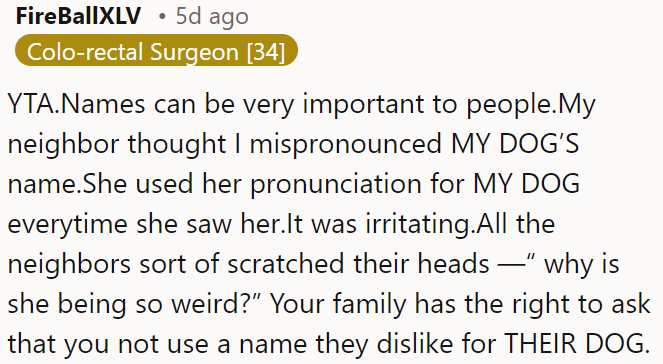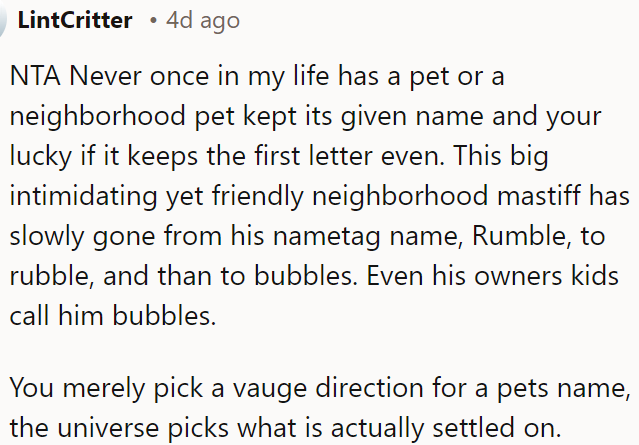Redditor Sparks Family Drama By Nicknaming Family Dog
Pets bring immense joy to households, often becoming beloved family members. Naming them can be an exciting part of this process, allowing family members to express affection and creativity.
However, this simple act can sometimes lead to disagreements, as seen in one family's story involving their pets and the nicknames they gave them.
OP's little sister turned ten in May and received a Chihuahua named Boba for her birthday. Although she promised to take care of the dog, it became a family pet.
OP, who lives next door, had a childhood dog with many nicknames, so giving pets nicknames is a family tradition.
In 2022, they got a Border Collie mix named Lulu, who also has nicknames like Louie and Loubear. OP's mom calls Lulu Potonski, a playful evolution from Louis Vuitton. This has never been an issue.
However, Boba’s name doesn’t resonate with OP. OP, who has a male cat named Shade (nicknamed The Shane), calls the Chihuahua Bobbie, Bob, or The Bobster. The family corrects OP to Boabster, Boabie, or Boabs, which OP thinks sounds like "boobs," but OP hasn't mentioned this to avoid being rude.
During a movie, OP's mom corrected him again when he called the dog Bobbie. OP remarked about the strange nicknames for Lulu, to which his mom snapped, "He isn’t your dog, so call him his name."
The next day, OP asked about it and was told he was being rude and disrespectful by renaming the dog. OP explained he wasn't trying to rename the dog; he was amusing himself. The family insisted on using Boabs, leading to an argument where OP was called immature and rude. So, is OP the asshole?
OP's little sister got a chihuahua for her 10th birthday, but the dog, Boba, has become a family pet despite her promises.

OP lives next door, and three years ago, their beloved family dog, who had many nicknames like Bear, Seal, and Rosie Bear, passed away.

The Impact of Nicknames on Relationships
The controversy surrounding a seemingly innocuous nickname for a family dog underscores the profound impact language and labels can have on relationships. According to Dr. Helen Fisher, a biological anthropologist, "Names and labels can evoke strong emotional responses and shape how we perceive our relationships." This suggests that what may seem like a playful nickname to one person can be interpreted very differently by another, especially when it touches on sensitive topics. This highlights the need for open dialogue about the meanings we assign to language in our relationships.
They got Lulu, a Border Collie mix, in 2022. She has funny nicknames, like Louie, Loubear, and Potonski, which evolved from Louis Vuitton.

But OP is just not fond of the name Boba.

The Psychological Impact of Nicknames
The issue surrounding the nickname for the family dog illustrates how words can carry profound emotional weight. A psychologist specializing in language and communication explains that nicknames can evoke strong feelings, often tied to personal histories and cultural contexts.
Research shows that the names and labels we assign to pets can influence our emotional connections with them. According to studies published in the Journal of Social Psychology, the way we perceive and interact with our pets is deeply affected by the names we choose.
The OP calls him Bobbie, but his family prefers Boabster, which he finds inappropriate. Therefore, he uses his proper name around others or during training.

OP was told not to call the dog Bobbie, and when he did, his mom snapped at him, insisting he use his real name since he's not his dog.

Moreover, the emotional responses elicited by nicknames can reflect broader themes of identity and belonging. Psychologists note that individuals often form strong attachments to names and labels, particularly when they relate to cherished family members—whether human or animal. The reaction to the nickname may indicate deeper feelings about how family members perceive and value the dog within the family unit.
Understanding this emotional landscape can help family members navigate conflicts around names and labels more effectively.
OP asked about it again because he felt uncomfortable, and they said he was being rude by disrespecting their boundaries.

They called OP immature and rude.

This situation also highlights the concept of social perception, where individuals interpret meaning based on the labels and identities presented to them. A social psychologist notes that the reactions to the nickname may stem from cultural sensitivities and personal experiences with similar language.
Research from the University of California suggests that socially charged words can evoke strong emotional responses, especially when they trigger memories or associations from the past.
OP is overreacting.

Nicknames develop naturally.

Navigating Family Disagreements with Empathy
When disagreements arise over seemingly trivial matters like nicknames, it's crucial to approach the conversation with empathy. Research shows that empathetic communication can significantly enhance understanding and reduce conflict. Engaging in active listening—where each person expresses their feelings and perspectives—can foster a more constructive dialogue about the emotional significance of the nickname.
By validating each other's feelings, family members can work towards a resolution that honors everyone’s emotional connections.
OP can call the dog whatever he wants.

If the dog isn't OP's, he should stop doing care tasks and respect their chosen name for the dog.

Family Dynamics and Emotional Reactions
The family drama surrounding the nickname indicates how deeply interpersonal relationships can influence emotional responses. A family therapist emphasizes that members may react strongly to perceived insults or disrespect towards family pets.
Research shows that pets often symbolize familial love and loyalty, making derogatory nicknames particularly sensitive topics. According to a study published in the Journal of Family Psychology, family dynamics can become strained when members feel their values or affections are disrespected.
OP should respect others' preferences.

Pets rarely keep their given names, often ending up with playful variations chosen by their environment.

Additionally, exploring the reasons behind the emotional reactions can provide valuable insights. A family therapist may suggest discussing the underlying feelings associated with the nickname, allowing individuals to express any concerns about identity, representation, or affection related to the dog. This deeper exploration can lead to a more comprehensive understanding of the emotional stakes involved.
By facilitating these conversations, families can strengthen their bonds and enhance their ability to address conflicts in the future.
As long as the nickname Boba isn't vulgar or derogatory, they should not care.

Psychological Analysis
This situation highlights the emotional attachment families have towards their pets, often viewing them as integral members of the family. It's essential for family members to communicate openly about their feelings regarding names and labels to foster understanding.
Addressing these conflicts collaboratively can strengthen family bonds and create a more supportive environment.
Analysis generated by AI
Analysis & Alternative Approaches
In summary, the conflict over the family dog's nickname reflects deeper themes of communication and family dynamics. Understanding the emotional significance of names can help families navigate such discussions more effectively.
Research consistently emphasizes the importance of open dialogue and mutual respect in resolving conflicts, particularly those involving beloved family members.
Psychological Analysis
This situation highlights the powerful emotional weight that names and labels can carry within families. It's essential for family members to engage in open conversations that acknowledge the feelings attached to these names, especially when they relate to beloved pets.
Facilitating these discussions can lead to deeper understanding and strengthen familial relationships.
Analysis generated by AI
Analysis & Alternative Approaches
In conclusion, navigating conflicts over nicknames within families requires empathy, effective communication, and a willingness to collaborate. By fostering open dialogue about the emotional significance of names and labels, families can work towards solutions that honor everyone's feelings.
Ultimately, these conversations can strengthen family bonds and promote a more harmonious environment.
To address this conflict, family members need to engage in open discussions about the implications of the nickname. Understanding why it bothers certain members can lead to deeper insights into individual feelings and values.
Research indicates that fostering an environment of open dialogue can significantly reduce tensions in familial relationships. According to a study from the University of Toronto, when family members feel safe to express their concerns, it leads to healthier interactions and emotional bonds.
Finding Common Ground in Family Decisions
Ultimately, finding common ground in family disagreements about nicknames requires a willingness to compromise. Research in conflict resolution emphasizes the importance of seeking collaborative solutions that meet the needs of all parties involved. In this case, families might consider developing a nickname that incorporates elements from both sides or agreeing on a playful alternative that respects everyone's feelings.
Through this collaborative approach, families can foster a sense of unity and understanding, transforming potential conflicts into opportunities for connection.
Finding Balance in Family Communication
Ultimately, finding a balance between humor and respect in family communication is crucial. Families can explore alternative names that reflect affection while avoiding potential misunderstandings.
Conflict resolution experts suggest that collaborative approaches to naming can foster stronger family cohesion. A study from the University of Michigan indicates that engaging in shared decision-making can enhance family relationships, leading to a more harmonious home environment.
Nicknames for pets often come about naturally and are a fun way to show affection. It seems OP is making a big deal out of the family's nicknames for Boba. Since Boba isn't OP's dog, it would be respectful to use the family's preferred name. Pets often have cute or funny nicknames, and it's usually not a big deal as long as the names are not rude or offensive.
If OP wants to use different nicknames, it would be better to discuss it calmly with his family instead of arguing. Ultimately, what matters is that Boba is loved and well cared for, no matter what he's called.



